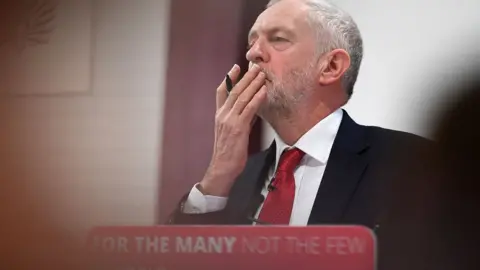Reality Check: Labour's Brexit position
 Getty Images
Getty ImagesThis was a wide-ranging speech setting out Labour's views of Britain's place in the world after Brexit. But the main focus was on the UK's future economic relationship with the European Union. The BBC's Reality Check correspondent Chris Morris has been looking at a few key quotes from the speech.
A customs union

This was the key passage of Jeremy Corbyn's speech - putting clear water between Labour and the government.
He wants to stay in a customs union to avoid the imposition of tariffs on goods traded within Europe, and to help solve the Brexit conundrum at the Irish border.
As a member of the EU, the UK is currently in the customs union, which means that all countries impose a common external tariff - in effect the same tax - on goods being brought in from elsewhere in the world. Once those goods have crossed the external border, there are no further tariffs to move them around inside the customs union.
Mr Corbyn wants to replicate most of that in a new customs union, which would certainly help companies who rely on moving goods across EU borders several times in their manufacturing process.
But it wouldn't entirely solve the problem in Ireland, because some of the border issues - such as food safety or animal welfare - involve regulations that are nothing to do with the customs relationship.

Future trade deals

Here Mr Corbyn addresses the government's primary reason for opposing the formation of a new customs union: that it would stop the UK doing trade deals around the world.
He says he wants to ensure that the UK will be able to negotiate new trade deals "in the national interest".
Although he is not explicit about what this involves in practice, it appears to mean that Labour wants the UK to be involved in negotiating those trade deals alongside the EU. He is not suggesting that the UK would be an entirely separate entity in international trade.
Membership of a customs union constrains your ability to sign your own trade deals, because you can't alter external tariffs. But you can negotiate on services, or on harmonising regulations with other countries.
Mr Corbyn argues that this is a compromise worth making, and it is another significant departure from government policy. The Conservatives accuse him of wanting to have his cake and eat it - a familiar theme.

The people's interests

This is Mr Corbyn's political pitch, trying to peel enough Tory MPs away from the government to be able to defeat it in Parliament on the question of a customs union. He is trying to position Labour in the middle ground - supporting what appears to be a softer version of Brexit rather than what he would see as a hard ideological one.
Of course anything Labour proposes, just like anything the government has proposed, does not have to win the approval of Parliament alone. It would also have to be negotiated with the rest of the EU, which remains suspicious of any UK effort to cherry-pick the best bits.

Immigration

Mr Corbyn was very clear about this - attacking the government for starting with what he called rigid red lines on immigration and only afterwards working out what it meant for the economy. He says it is very clear that free movement of people from the EU would come to an end.
There would, he says, be reasonable management of immigration, but the economy should always come first.
This is a delicate balancing act. Without free movement of people, the UK will not get the same access to the single market that it has now.
On the other hand, Labour can't ignore the "take back control" message entirely. But it is interesting to note that there was no mention at all in this speech of the future role of the European Court of Justice.

Middle ground?

It has always been clear that Jeremy Corbyn has never been a massive EU enthusiast. He says he campaigned for "Remain with reform" - which sounds suspiciously like David Cameron.
But he was trying to appeal to both Remain and Leave voters in this speech, arguing that Brexit would lead neither to disaster nor to a land of milk and honey.
Like the prime minister, he is trying to claim the Brexit middle ground. But, also like the prime minister, that doesn't mean he can sit on the fence, with little more than a year to go before Brexit is due to happen.

